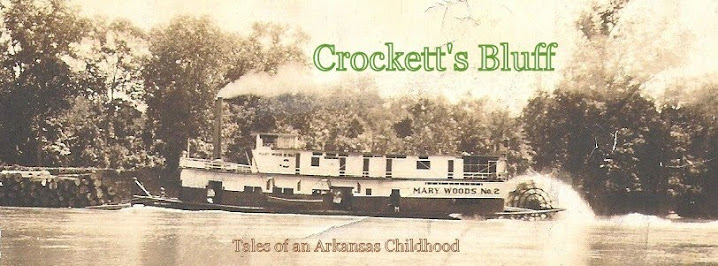Rare pic: Under the Old Pecan Tree at the Bluff
Neil, Bill, Maureen, Dale, Jack and Shelby
Memories of Jack
Since I was probably less than six years old in 1941 when my oldest brother Jack (actually Allie Loftin, named for his father and his mother's brother) left for the Navy, I remember little before that of him except for certain vague recollections of his driving the Arkansas A&M sports bus around the US before he left college to join the Navy. I was too young to have memories of his being at home during my early years before he left for college. He was actually not known to me as Jack but as "Bubber," my derivative of Bubba, apparently.
 There are, however, foggy images -- probably more fantasies than memories, perhaps products of my imagination in response to overheard conversations of my parents, such as his high school days at St. Charles High School provoked by a school photo of him in a neat sleeveless striped sweater. One mental image, however, of him standing in the kitchen next to the old cast-iron wood stove -- from my view the single light bulb hangs from a single twisted wire next to his face -- on the morning he left for the service remains clear and probably valid.
There are, however, foggy images -- probably more fantasies than memories, perhaps products of my imagination in response to overheard conversations of my parents, such as his high school days at St. Charles High School provoked by a school photo of him in a neat sleeveless striped sweater. One mental image, however, of him standing in the kitchen next to the old cast-iron wood stove -- from my view the single light bulb hangs from a single twisted wire next to his face -- on the morning he left for the service remains clear and probably valid.During the war years our family spent in the Highland Park Housing Project in Little Rock, Jack was represented by a single service star flag that was hung in the front window. When my brother Bill entered the Navy after high school, another flag with two stars was substituted.
 |
And then there is in my memory a clear picture of Jack walking down from the river road at the top of the lane and then up the hill to our house in his white sailor uniform. I seem to have heard the car stop there to let him off, perhaps, and I watched as he walked up, perhaps even calling to Mother as he did so.
It might have been during this return visit, or perhaps a bit later when I was a bit older, that he related to me the story of his failed marriage as we were driving back from DeWitt to the Bluff on one of his visits. Since I was much too young -- ten or eleven -- to understand the significance of his unfortunate state, I have often wondered why he chose or bothered to relate it to me. Perhaps he just wanted to vent his feelings one more time. He didn't appear angry; he didn't shout or curse; he didn't even raise his voice much; but he made it clear to me that his wife Margarite Moon (I thought the name quite exotic, since I had never heard of anyone named Moon before) had not only been involved with another man while he was in the service but had also spent the money he had been sending home to establish their post-war future.
Although he appeared to have resigned himself to these realities, he had also concluded that it "was now time for him to have a little fun for a change," or words to that effect. Perhaps this was his way of saying that his having apparently been faithful to her during his war years away had cost him something that needed to be compensated.
I'll never know, but looking back now with a bit of life experience of my own, my best guess is his feelings must have been more complicated than even he understood. Nevertheless, I understood on that afternoon in the car he had been hurt and deceived and wronged, even though the degree of these grievances was unclear, at least to me at that age.
After this visit, he became in future years more the subject of letters received and sent than a presence in the family. But there were the occasional brief visits, among which the most memorable was the one on which he brought along Alta Arnold. After that, I cannot recall seeing him alone again; they would be a pair to his dying day. [Enlistment mug shots courtesy of Loftin Woodiel and the National Archives. DPW March 28, 2006.


No comments:
Post a Comment